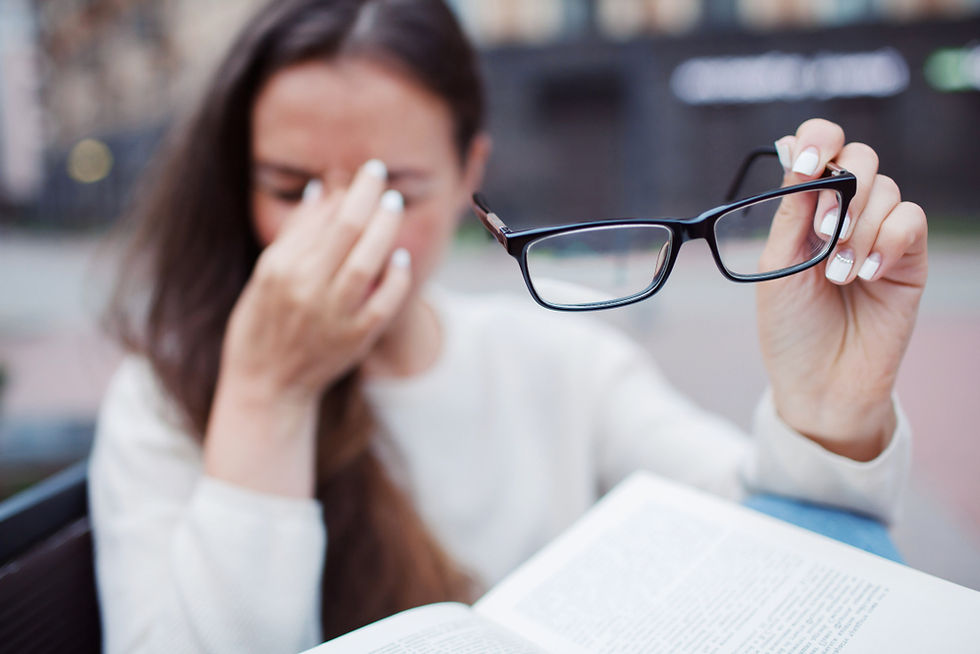Vitamin Deficiencies and Vision Loss
- Admin
- Dec 16, 2019
- 3 min read

No one wants to lose their vision, but unfortunately sometimes people do and it is completely out of their control. But what if you were to lose your vision to something completely in your control, like a vitamin deficiency?
Vitamin deficiencies are 100 percent preventable, however, they are the leading cause of preventable blindness. Vitamin A deficiency in particular can cause a lot of vision problems. But vitamin A isn’t the only nutrient your eyes need to be working and healthy.
Your eyes, like your body, need a multitude of nutrients and vitamins to prevent vision loss. If one is severely missing in the body, your eyes will bear the repercussions. Luckily, there are some really simple ways to get the vitamins and nutrients your eyes need.
Vitamin A Deficiency
A vitamin A deficiency is the hardest hit your eyes could possibly take. Vitamin A is absolutely essential to your vision health. It is THE eye vitamin. Without it, your eyes would be a total wreck. So, when someone has a vitamin A deficiency, it’s a safe bet that their vision will suffer immensely.
A vitamin A deficiency can lead to a vision condition called keratomalacia. Symptoms of this condition include: night blindness, dry eyes (often extreme cases), blurred or clouded vision, and softening of the cornea. As the condition progresses, it can lead to gray deposits being formed on the whites (sclera) or the eye.
Without treatment, keratomalacia can lead to blindness caused by ruptures, corneal infections, or degenerative tissues.
A vitamin A deficiency can also be a side effect of diseases such as celiac disease, liver disease, ulcerative colitis, and cystic fibrosis. But, no matter the cause of the deficiency, the result is the same. Your eyesight can’t survive.
Prevention
Preventing a vitamin A deficiency is easy to do, especially if you eat a whole lot of delicious and healthy foods!
Here are the top vitamin A-rich foods:
Sweet potatoes
Dark leafy greens
Carrots
Dried fruit (especially apricots)
Fish
Mango
These foods are all super versatile and easily incorporated into a home cooked meal.
Don’t think that you need an excessive amount of food to get your vitamin A. We’ve compiled a long list to give you options. If sweet potatoes aren’t your thing, a healthy amount of spinach or carrots will do the job just as well.
Vitamin B12 Deficiency
A vitamin A deficiency will directly impact your eyes, but several other vitamins may indirectly impact them. This is the case for a vitamin B12 deficiency. A lack of Vitamin B12 will likely lead to anemia which in turn can cause vision loss among several other conditions.
Some symptoms of a B12 deficiency include; fatigue, shortness of breath, constipation, and loss of feeling or a tingling sensation in the extremities.
Vitamin D Deficiency
Recently, scientists have discovered a correlation between the sunshine vitamin and age related macular degeneration. A vitamin D deficiency in older people with already declining vision has proven to worsen their conditions.
Everyone needs vitamin D and getting it is as easy as spending 10 minutes out in the sun. A vitamin D deficiency will not affect the eyes of a younger person, but once your eyesight begins to decline due to age, you’ll need all the help you can get. Exposing your eyes to a little bit of sunshine will help slow down the process of age-related macular degeneration.
Follow these tips, eat right, and take your supplements (if needed). And, stay healthy for not only your eyes, but your overall well-being.
This post originally appeared on Rebuild Your Vision.




Comments